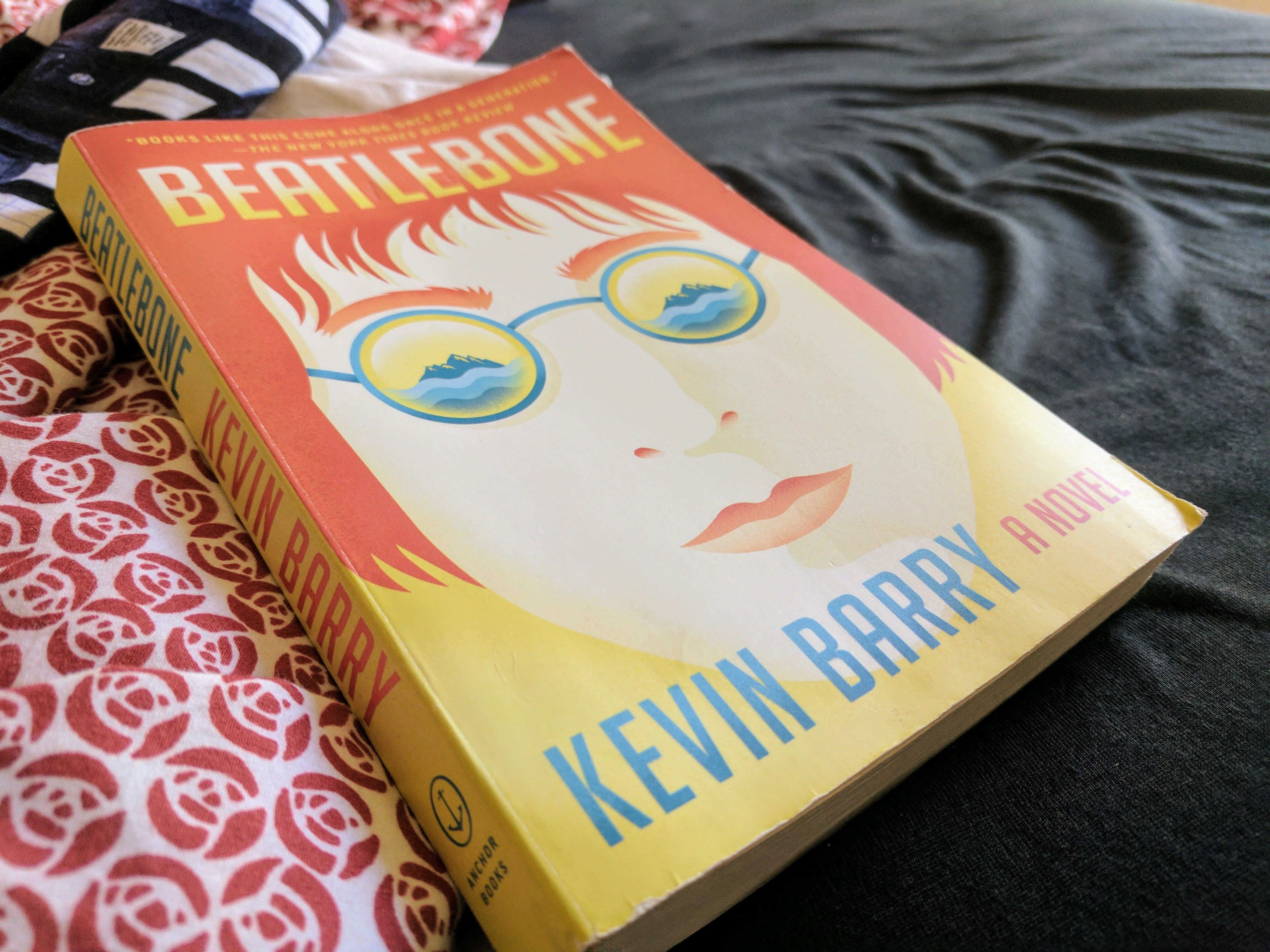
As I last wrote about back in March, I wanted a book with prose. While with Katie at Town Center Books in Pleasanton, CA the week before I had to head back to Indiana for most of the Spring, we asked the college student working the shop for such a prose-y book. He told us to check out Beatlebone by Kevin Barry. I would find the prose I sought within these pages.
I was already judging the book by its cover when we first walked into the store.
Not that you should ever judge a book by its cover, so we’re told, but a cover with what looks like Sgt. Pepper’s era John Lennon with a mountain island on the sea reflecting in his iconic World War I era circle frames is hard to miss.
I don’t know if I had already tipped my hand regarding my interest to the book by just looking at it or if it was a happy coincidence, but that college student sold me on it. And he wasn’t lying. Beatlebone had the prose I sought, and more.
Beatlebone was as much reading poetry and song lyrics as it was reading a novel. It was just what I was looking for to shake off the cobwebs.
What Beatlebone is about.
Beatlebone is a fictional story about John Lennon in 1978 wanting to get away from everything for a few days and have a primal scream session on a little island he owned along the west coast of Ireland called Dorinish. John being John, he hops in an old Mercedes limo in the dead of night, leaves New York City, and attempts to make his way out to this little rural Irish land. Of course, John being John, he has to navigate the paparazzi, adoring fans, and those attempting to get a piece of him just to try and find a little bit of this primal peace and quiet. To do this, he has to trust a mysterious navigator, Cornelius. Throughout the book John can’t make heads or tails of Cornelius. Is Cornelius protecting him or abducting him? Part of it is John being John (see a theme here?), and part of it has to do with the absurdity within the life events he’s endured being a founding member of The Beatles.
In the end, it becomes a [Spoiler Free] crap shoot as to whether or not John makes it to his island, or if he wants to, or if it even matters anymore. Beatlebone is quite a telling tale of how even the seemingly simplest decisions could turn into odysseys for Lennon, as well as the display of grit and determination it took for him to wonder [or wander] free from New York City and his Dakota building apartment.
It’s a tale as immaculate as it is appalling as it is plausible. I didn’t expect it to travel down so many rabbit holes and, in this case, caves.
“Is Dorinish a real place?”
Dorinish is in fact a real island. John Lennon actually owned the island from the 1960s through his death. After he died, Yoko sold the island and donated the proceeds. John even went so far as to try to have a commune set up there around 1970, but the raw primal power of the island proved too much for the immigrants. It is a place for “rabbits and dirty birds,” as Cornelius (I think) says. The unfettered natural life cycles in the area will test hardened outdoorsmen, let alone uncalloused city folk.
And, yes, Dorinish and the places along the way play as much a part of the story as any character.
Such as Brian Wilson the dog.
I wonder if Brian Wilson the dog was a great relative of Paul Anka (the dog).
What I liked most about Beatlebone was the texture.
The writer, Kevin Barry, went full out on the texture. Abstraction and imagery supplanted simple adjectives. You could touch, taste, and smell descriptions so much as see them in your head. Barry would use phrases like, “the coils in his voice,” (I think that’s how it was said). Simple lines weren’t thrown away.
“There is a wardrobe full of old suits. It sits there like an accusation.”
I just lapped up the turns of phrase until I had to piss, then I let out what my body couldn’t use and lapped up more.
And I adored the acute hate for Kate Bush.
Undying competitive pettiness sounds like everything I’ve read about John.
That’s another aspect I loved about the book: it seemed to spot-on hit off-camera John.
John was a great man, but he wasn’t always a good man. That’s a lot of what this book seems to get to, whether or not it knew it was heading there. I’m guessing it was a happy discovery. Aside attempting to impress our attracted sex, why else do we write?
“For prayer.”
Fuck off. Don’t make me feel guilty about being a smartass.
There might be a swear word or two and an intense scene or three which might induce fits of awkwardness for domestic readers. But he spells “fucken” with the Irish “e” so it’s okay.
The words are used for authenticity’s sake. John wasn’t nearly as squeaky clean as he appeared through 1966.
I also liked the fourth-wall interjection. It will disrupt you, but just a little. When you find it, you’re not at the end of the book. Keep going.
I write that for some of my friends who like to read the book itself and not the background information. They want the story to do the work. So, I write warning them – and those of you like them – that there is a part where Barry interjects for a few pages to discuss the depth of his research. It helps validate the plausibility and pretense to that aspect of the story. And that he put himself through a similar test in the spot he wrote about, and almost fucked himself up about it. Primal indeed.
So, keep going. You didn’t reach the epilogue.
I will lose my mind if the lost Beatlebone tape ever resurfaces.
Because I want so much for this story to be as true as it was real.




Leave a Reply
You must be logged in to post a comment.